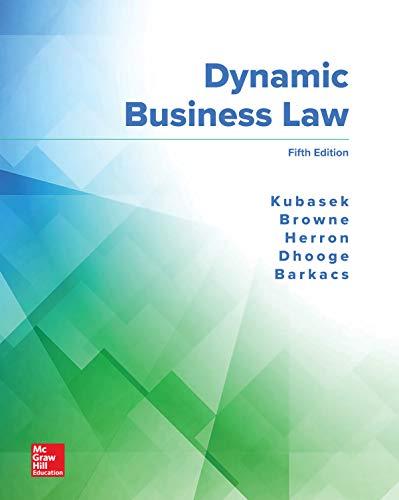Edwina Rogers and Edward Rogers were a married couple who had employed the services of Jon Deane
Question:
Edwina Rogers and Edward Rogers were a married couple who had employed the services of Jon Deane for his professional tax and accounting services from the mid-1990s to 2010. Mr. Deane prepared federal income taxes, IRS Form 1040s, and state income taxes for Mr. and Mrs. Rogers under the “Married Filing Jointly” status. Mr. and Mrs. Rogers employed child-care professionals and were required to pay FICA and federal income taxes as employers. In that same year, Mr. Deane began filing a Schedule H with the married couple’s joint returns that identified Mrs. Rogers as the statutory employer for tax even though Mr. Rogers paid the child-care employees’ salaries.
In September 2009, the Rogers legally separated but were not yet divorced. However, Mrs. Rogers continued to reside in the same house. The following year, Mr. Deane submitted a joint IRS Form 4868, Application for Automatic Extension of Time to File U.S. Federal Income Tax Return, for both Mrs. and Mr. Rogers as he had done in previous years. The completed form indicated that the Rogers estimated that they had no remaining tax liability.
Two months later, Mr. Deane submitted a tax return for Mr. Rogers, completed as “married filing separately,” claiming all tax exemptions, deductions, and credits, and left Mrs. Rogers with the tax liabilities for the child-care employees.
Mrs. Rogers fired Mr. Deane and retained a new accountant. Mrs. Rogers then filed her “Filed Separately Return” and did not pay her tax liability at that time. In 2011, Mrs. Rogers received an IRS deficiency notice and responded by admitting her tax liability but being unable to pay because of divorce proceedings. In early 2013, Mrs. Rogers filed an action against Mr. Deane that was dismissed with leave to amend her complaint. On August 2013, Mrs. Rogers amended her complaint and pleaded three counts against Mr. Deane, seeking relief for breach of contract, breach of covenant of good faith and fair dealing, and statutory business conspiracy.
Does Mrs. Rogers’ claim have grounds for any of the three primary types of common law accountant liability? If so, which one and why? How do you believe the court decided this case and why?
Step by Step Answer:

Dynamic Business Law
ISBN: 9781260247893
5th Edition
Authors: Nancy Kubasek, M. Neil Browne, Daniel Herron, Lucien Dhooge, Linda Barkacs





